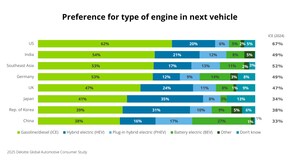NEW YORK, May 4, 2021 /PRNewswire/ --
Key takeaways
- While the manufacturing industry recouped 63% of jobs lost during the pandemic, the remaining 570,000 had not been added back by the end of 2020, despite a near record of job openings in the sector.
- U.S. manufacturers surveyed believe that finding the right talent is now 36% harder than it was in 2018, even as the unemployment rate has nearly doubled the number of available workers.
- Seventy-seven percent of surveyed manufacturers say they will have ongoing difficulties in attracting and retaining workers in 2021 and beyond.
- Diversity, equity and inclusion (DEI) is a growing influence on workforce trends and represents both a challenge and a potential solution to manufacturing hiring and retention.
Why this matters
Left unabated, the manufacturing skills gap — which is now anticipated to leave 2.1 million jobs unfilled by 2030 — could cost the U.S. economy as much as $1 trillion. Deloitte and The Manufacturing Institute's new report, "Creating pathways for tomorrow's workforce today: Beyond reskilling in manufacturing," explores new and prevailing contributors to the skills gap and outlines important steps manufacturers can take to attract and retain skilled and diverse workers, especially women and underrepresented minorities (URMs).
The study includes data analyses from two online surveys totaling more than 800 U.S. based manufacturing leaders, interviews with executives from manufacturing organizations across industry sectors, extensive analysis of secondary data on labor supply and demand, and economic projections from Deloitte's economic team.
COVID-19 worsens manufacturing's workforce conundrum
According to the study, the pandemic outbreak initially erased approximately 1.4 million U.S. manufacturing jobs, undoing more than a decade of manufacturing job gains. While the industry was able to hire back 820,000 of these jobs by the end of 2020, the remaining 570,000 had not been added back, despite nearly 500,000 job openings. This is true despite a near-record pace of job openings in the sector. Executives surveyed reported they cannot even fill higher paying entry-level production positions, let alone find and retain skilled workers for specialized roles.
- According to surveyed U.S. manufacturers, finding the right talent is now 36% harder than it was in 2018, even though the unemployment rate has nearly doubled since.
- The top two consequences cited by manufacturers of not being able to fill jobs were the inability to increase revenue growth (82%) and maintain production levels to satisfy demand (81%).
- Seventy-seven percent say they will have ongoing difficulties in attracting and retaining workers in 2021 and beyond.
- The study points to the top reasons these positions tend to go unfilled, with new entrants having different expectations for jobs and careers topping the list (38%), followed by lack of attraction or interest in the industry (36%) and retirement of baby boomers (34%).
- According to Deloitte's analysis, 8 in 10 job titles with the highest number of job postings in 2019 and 2020 were for entry and mid-level positions, generally requiring only a post-secondary certificate or high-school diploma.
- Warehouse and distribution jobs are increasingly competing for manufacturing workforce share, despite entry-level jobs in manufacturing averaging $15.55/hour, or double the minimum federal wage, and manufacturing wages for skilled workers are even higher.
- The report also notes, that while manufacturers have recovered just 60% of jobs lost, warehousing and storage recovered all jobs lost during the pandemic and then doubled the number of these positions by the end of 2020 for a recovery rate of 204%.
Moreover, the study found that the ongoing challenges in attracting entry-level and skilled workers in the right geographic markets are often frustrated further by misconceptions about manufacturing work, especially amongst younger generations, and whether it can deliver rewarding career experiences with work-life balance.
Key quote
"Given the foundational role the manufacturing sector plays in our nation's economy, it is deeply concerning that at a time when jobs are in such high demand nationwide, the number of vacant entry-level manufacturing positions continues to grow. Attracting and retaining diverse talent presents both a challenge and solution to bridging the talent gap. To attract a new generation of workers, the industry should work together to change the perception of work in manufacturing and expand and diversify its talent pipeline."
- Paul Wellener,
vice chairman and U.S. industrial products and construction leader, Deloitte LLP
Workforce diversity: an imperative to closing the gap
While it's well-established that women are underrepresented in manufacturing, the study found 1 in 4 women are considering leaving the industry. This only adds to the broader trend of pandemic-related attrition that has impacted women disproportionately and created an acute challenge for manufacturers looking to curb the flow of those leaving, while adding diversity to its existing workforce. The survey also found that some well-intentioned DEI programs are not fully meeting their intended objectives, with many underrepresented groups in manufacturing seeking additional opportunities for career progression.
- According to the study, 30% of manufacturing professionals are women, despite representing nearly half of the overall U.S. workforce. And women represent only about a quarter of production jobs.
- Women surveyed were 1.8 times more likely than men to contemplate leaving the industry, citing the lack of work-life balance and the need for flexible schedules as top reasons to leave.
- Half of manufacturers surveyed already have a formal program in place to recruit women and 42% of respondents assessed their company's efforts in the recruitment of women as substantial.
- A majority of manufacturers have included DEI training in talent management programs, though fewer than one-fourth of respondents find these programs impactful in actually retaining employees.
The roadmap to a more diverse and inclusive industry
Several large-scale efforts are underway to address these trends and cultivate a manufacturing workforce that is more reflective of our communities. For example, The Manufacturing Institute's STEP Women's Initiative was launched to retain and recruit more women into manufacturing through recognition, research, leadership and mentorship. Initiatives such as this are indicative of the sector's larger commitment to close the skills and the opportunity gap.
Key quote
"Manufacturers are proud to lead efforts to build stronger, more diverse and inclusive workplaces because we are committed to being the solution. These findings confirm the urgency of our mission and that we need not only to continue our work but to accelerate it. As we expand our programs at The Manufacturing Institute, and work with the National Association of Manufacturers on initiatives like our Creators Wanted campaign and tour, we're making sure that Americans of all backgrounds in all states can find a home in manufacturing and get equipped with the skills to seize these opportunities. With so many open jobs in manufacturing, we are uniquely positioned to welcome emerging and displaced workers into rewarding and meaningful careers."
- Carolyn Lee
executive director, The Manufacturing Institute
Recommendations for closing the skills, employment and retention gaps
The industry appears at a tipping point and should work quickly to change the perception of work in manufacturing for a new generation of workers as well as to diversify the talent pipeline entering the industry. To do so, manufacturers should proactively engage with potential talent pools and also revamp work-life balance, skills training and equitable career pathways to retain employees they cannot afford to lose. Those efforts to consider should include:
- Engage more with local communities to recruit talent against competing jobs.
- Seek to hire former military personnel for mid- to highly-skilled positions.
- Broaden talent pipeline to draw more diverse job candidates.
- Candidly assess company culture to identify areas of improvement with DEI programs.
- Tie leadership performance to DEI metrics.
- Launch recruitment efforts at the high school level to build awareness of career-building and attractive pay in manufacturing.
- Consider reorienting shift-based jobs toward more flexible arrangements.
- Leverage advanced technologies, including virtual reality training, to increase digital skills.
For more insights on what companies should consider as they navigate the increasingly complex skills gap, please visit here. Connect with us on Twitter at @DeloitteMFG; @TheMfgInstitute; @pwellener or on LinkedIn @PaulWellener.
About Deloitte
Deloitte provides industry-leading audit, consulting, tax and advisory services to many of the world's most admired brands, including nearly 90% of the Fortune 500® and more than 7,000 private companies. Our people come together for the greater good and work across the industry sectors that drive and shape today's marketplace — delivering measurable and lasting results that help reinforce public trust in our capital markets, inspire clients to see challenges as opportunities to transform and thrive, and help lead the way toward a stronger economy and a healthier society. Deloitte is proud to be part of the largest global professional services network serving our clients in the markets that are most important to them. Building on more than 175 years of service, our network of member firms spans more than 150 countries and territories. Learn how Deloitte's more than 330,000 people worldwide connect for impact at www.deloitte.com.
About The Manufacturing Institute
The MI grows and supports the manufacturing industry's skilled workers for the advancement of modern manufacturing. The MI's diverse initiatives support all workers in America, including women, veterans and students, through skills training programs, community building and the advancement of their career in manufacturing. As the workforce development and education partner of the NAM, the MI is a trusted adviser to manufacturers, equipping them with resources necessary to solve the industry's toughest challenges. For more information on the MI, please visit www.themanufacturinginstitute.org.
Deloitte refers to one or more of Deloitte Touche Tohmatsu Limited, a UK private company limited by guarantee ("DTTL"), its network of member firms, and their related entities. DTTL and each of its member firms are legally separate and independent entities. DTTL (also referred to as "Deloitte Global") does not provide services to clients. In the United States, Deloitte refers to one or more of the US member firms of DTTL, their related entities that operate using the "Deloitte" name in the United States and their respective affiliates. Certain services may not be available to attest clients under the rules and regulations of public accounting. Please see www.deloitte.com/about to learn more about our global network of member firms.
SOURCE Deloitte

Related Links
WANT YOUR COMPANY'S NEWS FEATURED ON PRNEWSWIRE.COM?
Newsrooms &
Influencers
Digital Media
Outlets
Journalists
Opted In





Share this article